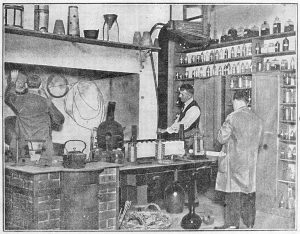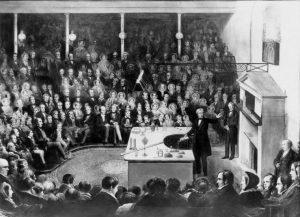
Leading by example – Michael Faraday
Recommended for Foundational Grades
Michael Faraday
We use electricity for almost everything in our lives. What would we do without it?
For this, we can thank the scientist Michael Faraday. It was largely due to his efforts that electricity became practical for use in technology.
For this, Michael Faraday is also known as the “Father of Electricity”.
His early life
Faraday was born on 22 September 1791 in London, England. As his family was poor, he received only a basic formal education.
Then, at the age of 14, Mr Faraday became the assistant of a bookbinder. There, he discovered his love for books. He taught himself knowledge by reading a wide variety of books over the years.

Faraday’s laboratory
Faraday’s discoveries
He discovered electromagnetic induction. This helped him invent the first electric motor and electric generator.
What is electromagnetic induction?
Electromagnetic induction is the creation of an electro-motive force (EMF) by way of a moving magnetic field around an electric conductor. This discovery was a fundamental principle in understanding and harnessing electricity.
Not only that, but Faraday was also a keen chemist. He discovered Benzene among other chemicals. Moreover, he popularised common words such as “anode“, “cathode“, “electrode” and “ion“, which we use today.
And Michael Faraday could do all this despite not having a degree in higher education!
In 1833, Faraday became the first Fullerian Professor of Chemistry at the Royal Institution of Great Britain. His lectures there at Christmas time became very popular. And the tradition still continues today.

Faraday’s Christmas lectures
Michael Faraday died in 1867. He is considered to be one of the most influential scientists in history.
We at Curious Times are committed to providing the best experience and news to children. Do also check out the Curious Times Weekly newspaper every week and The Curious Magazine every month. We are delighted to publish the creative art, photographs, write up and more that children send us in My Expressions. Write to us at hello@curioustimes.in. You can also reach out to us on WhatsApp, Instagram, Youtube, Twitter, LinkedIn, Facebook.
0 (Please login to give a Curious Clap to your friend.)
